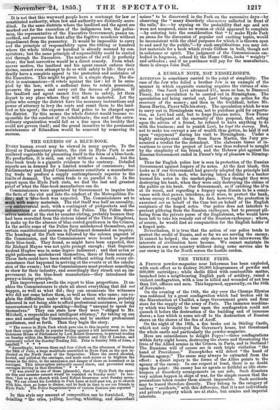A RUSSIAN NOTE, NOT NESSELRODE'S.
ACUTENESS is sometimes carried to the point of simplicity. The case of the Jew who foiled a brother Jew is an example of the manner in which exquisite cunning acquires the virtues of sim- plicity. One Jacob Levi advanced 471., more or less, to Emanuel Piezer, for a speculation to be carried out in Birmingham. The speculation not being carried out, Levi brings an action for the recovery of the money ; and then in the Guildhall, before Mr. Baron Martin, Piezer tells his story. The speculation which he was to carry out in Birmingham was, not to purchase gold for exporta- tion, as Levi had said, but to forge Russian notes. Now Piezer was so indignant at the enormity of this proposal, that, noting upon the advice of a friend, he refused to have anything to do with the business; and to punish Levi, he kept the money. But, not to make too corrupt a use of wealth thus gotten, he laid it out upon "enjoyment" during his visit to Birmingham. Tinder a highly metaphysical charge from Baron Martin, the Jury pro- nounced a verdict for the defendant. The elaborate tissue of in- ventions to cover the project of Levi was thus reduced to nought by the simplicity of his friend, and the Hebrew plot against the Russian Government ended in Piezer's trip of pleasure to Birming- ham.
Thus far English police law is seen in protection of the Russian Government against forgery of its notes. At the first blush, this looks as if our Government had gravely adopted the principle laid down by the Irish mob, who having taken a dislike to a banker burned his notes in the market-place. They thought they were destroying his bank, when they were only destroying the claims of the public on his bank. Our Government, as if catching the idla at its recoil, and regarding a forgery upon Russia to be a oonni- vance with that power, interferes, as it were, to protect the bank, whose enemy it ought to be. In fact, however, the proteotion is exercised not on behalf of the Czar but on behalf of the English recipients of the forged notes. Our police does not interfere to prevent pilfering from the Russian exchequer, but to prevent pil- fering from the private purse of the Englishman, who would have been left to take his remedy out of the Russian exchequer; where, of course, he would find no compunction for the English holder of a forged note.
Nevertheless, it is true that the action of our police tends to protect the credit of Russia, and so far we are serving the enemy. It cannot be helped; the case only shows us how interwoven the interests of civilization have become. We cannot maintain its interests in our own country without doing some service also to our enemy in the far North across the hostile cordon.
























 Previous page
Previous page